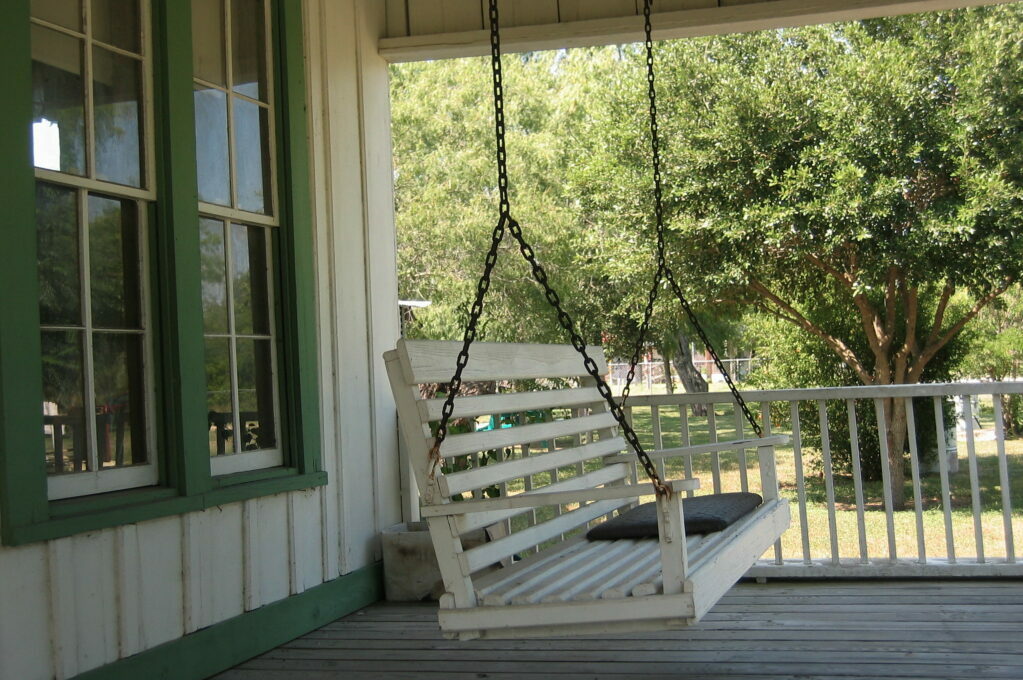At swim lesson when the kids were little, the Hausers narrated their Debbie’s every move. They shouted instructions. This from the parent side of the huge glass windows that were reminiscent of an aquarium, our children like exotic creatures from the deep that we could watch but not touch. Debbie, on the other side of the glass, couldn’t hear a word, but she turned and smiled and waved from time to time, and when she did, the Hausers said, “Watch! Your teacher’s telling you what you’re going to do today!” They said, “If she’d only pay attention, she’d know what to do.” They said of my Oscar, “Look at him diving down again! He’s a bottom feeder!”
At Friday night halftime shows after the kids joined the high school marching band, I could hear the Hausers above the music. They said, “She wouldn’t bounce so much if she’d just roll her feet.” They said, “Come on, Debbie. You can do this! You’ve practiced it a million times.”
I squeezed Pete’s hand like it was a lump of coal I was trying to Superman into a diamond. I whispered that I wished Debbie would knock her parents out with sedatives and sew their lips together while they were unconscious.
Pete winced.
I said, “Aren’t you at least a little bit surprised she hasn’t murdered them yet?”
He said, “Maybe she simply feels loved.”
My husband is more tolerant than I am. When at Thanksgiving, his sister Maureen herded everyone into their parents’ backyard to watch her daughters, triplets, show off their latest cheerleading stunts, he clapped his hands and said, sincerely, “That was really something.”
I, on the other hand, consumed a goblet of wine. Later, after another goblet of wine, I talked at length about the increasing incidence of head trauma, spinal injuries, and death among cheerleaders.
When the Hausers commented aloud about Oscar, how steady his hands were with the drum sticks and how smoothly he glided along the field, Pete grinned at me.
In the summer before their senior year of high school, Oscar asked Debbie out, and I imagined the Hausers spying on them from the photo booth in the lobby of the movie theater as Oscar and Debbie stood in line for popcorn. “Don’t fidget, Honey! Relax!” “He just bought one popcorn. They’re going to share.” “I hope he washed his hands.” “She’s like, I can’t believe I’m on a date with a boy!” “I think she’s trying to take his hand.” “Take his hand, Debbie!”
Within three weeks, Oscar was eating dinner at the Hausers’ twice a week.
When Debbie was at our house, the two of them watched old black-and-white movies. They sat on the porch swing and threw pine needles at each other. In the kitchen, they beat eggs and sifted flour. From these raw ingredients grew cakes so light and springy and delicious that I felt something crack inside me upon the first taste. Pete was seated next to me, Oscar and Debbie across from us. They said, “What do you think?” They said, “We think it’s the perfect amount of sweetness.” They said, “We browned the butter.”
I said, “It’s the best cake I’ve ever tasted.”
Oscar and Debbie grinned. They took off upstairs to do their calculus homework.
Pete took my hand. He said, “What’s wrong?”
I was thinking about those swimming lessons—Oscar on the other side of a thick pane of glass, me on a plastic chair in a crowd of other parents. I had this urge to call out to him. But I knew he couldn’t hear me. That he wasn’t even looking at me. Worse, he didn’t need any instruction I might offer.
–
Michelle Ross is the author of There’s So Much They Haven’t Told You (2017), which won the 2016 Moon City Press Short Fiction Award. Her fiction has recently appeared in Alaska Quarterly Review, Colorado Review, Epiphany, The Pinch, and other venues. Her work was selected for the Wigleaf Top 50 for 2019 and was a finalist for Best of the Net 2018. She’s fiction editor of Atticus Review and was a consulting editor for the 2018 Best Small Fictions anthology.
Lead image: “Porch Swing in Helena, TX” (via Flickr user Jon Connell)

